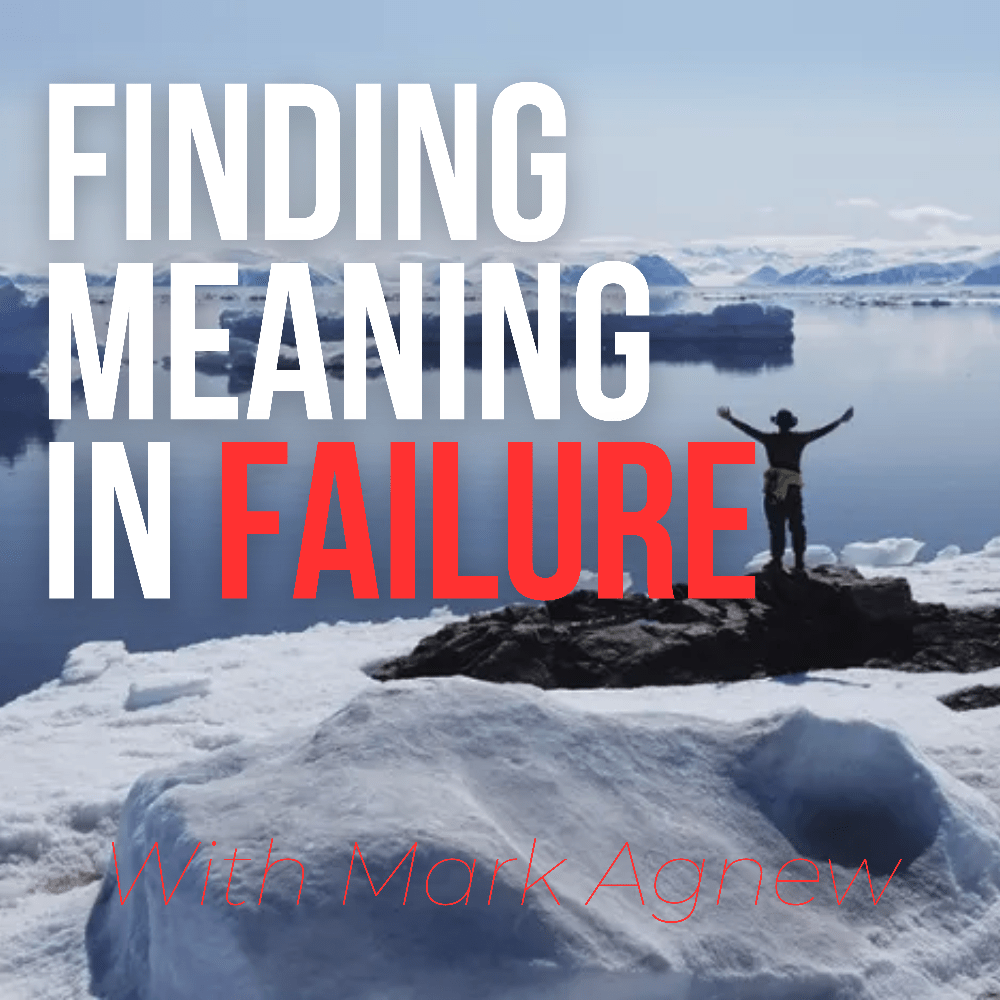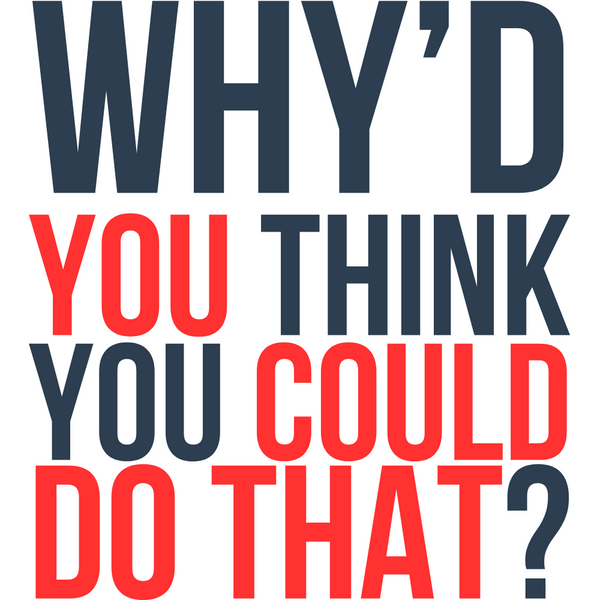
Mark Agnew on Kayaking the Northwest Passage: Finding Meaning in Failure
Share
From public humiliation on the Atlantic to a world-first kayaking the Arctic’s most unforgiving corridor, Mark Agnew has lived a story that reframes failure as fuel. Twice he set out to row the Atlantic. Twice he failed — once rescued within 48 hours and mocked by the press, once stepping off the boat and living with the ache of that decision for years.
Drawn from his conversation with Sam Penny on Why’d You Think You Could Do That?, this in-depth feature traces how reframing struggle, leaning on others, and loving the process more than the podium can turn defeat into direction — and why the Northwest Passage became the canvas for his redemption.
By Sam Penny · · Read time: ~15–17 minutes
Watch the Interview



From Rugby Dreams to Ocean Schemes
Adventure was in the air of Mark Agnew’s childhood — a father with a reputation for the wild, a mother who once moved across continents the slow way. Yet as a kid in Edinburgh, Mark wanted rugby more than records. The ocean entered by accident. At university, a friend sent a clip of people rowing the Atlantic and tagged it with four words: “Let’s do this.” It was naïve, almost comedic in its simplicity — and exactly the sort of spark that starts real change.
We like to imagine big lives begin with detailed plans. More often, they begin with a small honest yes. The spark isn’t a guarantee; it’s an invitation. Mark said yes, and with that yes came a chain of events that would teach him about failure, identity, and the kind of resilience that bends but doesn’t break.
“The spark is never the guarantee of success. It’s the door into a bigger room.”
His early forays into expedition planning were part enthusiasm, part spreadsheet theatre. Boats, crews, logistics — the admin often looks like the journey. Then you meet the real thing, and the real thing has its own rules.
48 Hours to Disaster: “Captain Calamity”
The first Atlantic attempt collapsed almost immediately. Ten people were crammed onto a fragile catamaran. Water found the leaks that confidence couldn’t patch. Makeshift hatches sealed with pool noodles made for good banter and poor seamanship. Within 48 hours, the crew was rescued. Headlines did what headlines do. “Captain Calamity.” Photos that make Mum worry. Friends who don’t know whether to rib you or hug you.
Public failure hurts twice. It injures the body of your plans and the ego that carried them. But a funny thing happens after the humiliation wave passes: if you pay attention, you find yourself a little more honest, a little less enchanted by image, and a little more interested in the work.
“Failure doesn’t just stop us — it whispers. If you listen carefully, it also tells the truth.”
The Second Fall: When Quitting Feels Like a Scar
The second shot was leaner, quieter, and technically better. Two men. Storms. Equipment wobble. A decision that looked sensible on paper: step off the boat. Safety calculations do not ask whether your soul is ready. Mark did the responsible thing and then lived with the ache of that choice. Every news piece about someone else crossing the ocean pressed on the bruise.
This is the failure most of us know: not a single spectacular collapse, but a choice that won’t leave you alone. It follows you into the kitchen and the commute. It questions whether you are the person you thought you were. Mark would carry that question for years — through jobs, relationships, and the quiet space before sleep.
Reframing Failure: From Toughness to True Resilience
We celebrate grit in posters and podcasts. But gritting forever is not resilience; it is rigidity with better PR. Mark’s pivot came in slow conversation with himself and, crucially, with others — psychologists, teammates, mentors. He realised his motives had drifted toward external scoreboard thinking: titles, firsts, and applause. Outcome addiction makes you brittle. One gust and the structure cracks.
Reframing began with four pillars he now speaks about openly: challenge, experience, relationships, and causes. Challenge is the honest edge of your ability. Experience is love for the doing. Relationships are the rope team that gets everyone home. Causes are why the story matters beyond you. When your motives shift this way, you stop forcing yourself into pretence-toughness and start choosing flexible strength.
“If you’re too tough, you can’t be resilient. The reed survives the storm because it bends.”
Practising Resilience: Hong Kong Seas & Storm Joy
Mindset changes in the living, not the lecturing. Mark’s practice ground became the coastlines of Hong Kong. Forecasts that hinted at chaos. Swell that made plans into suggestions. In that water he learned to enjoy uncertainty — not merely tolerate it — and to distinguish between honest fear (useful data) and ego noise (a drama queen with your voice).
He re-mapped his identity from “man who must prove” to “man who is present.” That shift turned “failed ocean rower” into “next-time adventurer,” and it built the base capacity for the call that changed everything: a last-minute spot on a team attempting the Northwest Passage.
Northwest Passage: History, Risk & Readiness
For centuries, the Northwest Passage was a cautionary tale written in ice. Franklin’s expedition disappeared into it. Amundsen threaded it. Warming has changed the calendar but not the character of that sea. It remains a labyrinth of floes, fog, and distance that looks small on a map and huge from a kayak.
When the invitation came, the old Mark might have heard it as a chance to erase old headlines. The new Mark heard it as an opportunity to practise what he had learned: show up, choose team over ego, and let the daily work be enough. Over 103 days and roughly 3,000 kilometres, the team paddled through weather that cancelled visibility and patience, nursed bodies that complained in new dialects, and made the thousand small calls that keep people alive and progress honest.
“Redemption isn’t one day. It’s the compounding of many days that no one sees.”
Fieldcraft & Teamcraft: How Adults Survive Big Goals
We glamorise achievement, but the engine room is fieldcraft — the dull, precise habits that keep risk inside the envelope. Kit checks when you’d rather collapse. Redundancy that looks paranoid until something fails. Calories that match output. Way-finding that respects fatigue. Team communication that is boringly clear.
Underneath that is teamcraft: agreeing on pace that preserves the group, laughing early to bleed tension, naming problems before they grow claws. At sea, you learn to trade “my best pace” for “our finish pace.” In business, that looks like prioritising compounding wins over heroic sprints that burn people.
Polar Bears, Thin Ice & The Calm Decision
Adventure stories love animal encounters; real ones are quiet and administrative. When a polar bear arrives in your perimeter, there is no time for epics. There is only procedure and tone. Mark’s team executed the plan: gather, assess, act. Thin ice demands the same temperament. Move like you mean to go home after this. The lesson scales to boardrooms and backyards: calm is a decision you make before the crisis, and you practise it in drills no one claps for.
“Bravery is not noise; it’s the ability to make a good decision at ordinary volume.”
Imposter Syndrome After the Record
Achievement does not vaccinate against doubt. Post-Passage, Mark still felt the oddness of encouraging others while remembering his own lowlights. That is not hypocrisy; it’s humanity. Imposter syndrome often visits precisely when you are growing. The useful move is not to wait for its absence but to keep acting with it in the room.
Mark’s answer is permission-based resilience: allow yourself to adapt, to laugh at your old self, to ask for help without issuing yourself a moral citation. Courage is not the silence of fear; it is the coordination of fear with values.
9 Lessons You Can Use This Week
1) Call It Act Two, Not Failure
Language shapes posture. When a plan collapses, rename it. Act Two implies continuity and craft. Ask: what is this moment preparing me for? Write the answer and behave as if it’s true.
2) Swap Toughness for Flexibility
Rigid stances snap under shifting loads. Flexible systems pivot and survive. In practice: change your plan without changing your purpose. Pivot is not betrayal; it’s professional honesty.
3) Build the Rope Team
Invite feedback before you need rescue. The best time to ask for help is when you don’t strictly need it. That way you’ve built the habit and the trust before storms arrive.
4) Redundancy is Grown-Up Bravery
Two stoves, two nav methods, two suppliers. Redundancy looks expensive until failure does the maths for you. Adults plan to keep playing next season.
5) Measure in Kilometres, Not Myths
Big outcomes are lagging indicators. Daily distance is the leading indicator within your control. Set a repeatable unit (calls made, words written, kilometres paddled) and protect it like fire.
6) Make Calm Your Default Setting
Drill the response you want in crisis so that it arrives by muscle memory. Calm is a skill, not a vibe. Practise when stakes are small.
7) Rehearse Uncertainty
You can train for unknowns. Schedule “variable days” where you deliberately change constraints: time, tools, team. It builds the same adaptability Mark found in chaotic swells.
8) Write the Three Sentences
I want to… I am going to… name intent. I am afraid that… names the dragon. Even though I am afraid of…, I will… anyway. names your move. Simple sentences, powerful trajectories.
9) Choose the One Thing
Clarity beats volume. Finish this and act today: “One thing I will do to make a difference…”
Listen, Subscribe & Explore the Guest Hub
Watch the full conversation above, listen on your favourite platform, and explore quotes, prompts, and resources on Mark’s Guest Hub.
